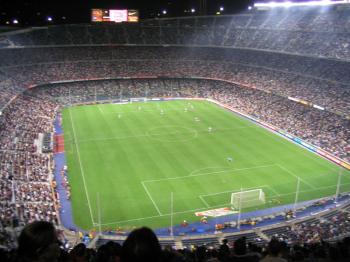The news that Magnier and McManus, the two Irish magnates shrouded in mystery at the heart of the affair, had opted to take the money and sell their stake to the American tycoon, opens the door for the most high profile casualty yet of football’s corporate tragedy.
Like Manchester United or loathe them – and like most fans of most clubs, I’d happily see them fall from grace by natural causes – it’s very difficult to sit comfortably and gloat. Because the cold truth is that, although United are the victim here, this is a risk to which most football clubs are prone, and especially those listed on the Stock Exchange.
Moreover, for all that many, many United fans clung onto the coat-tails of nineteen nineties success, it must be said that a genuine core of United fans are the envy of many clubs. Even in lean times they have commanded gates to rival anyone in the land; the away support which came to Burnley two seasons ago in the League cup was worthy of high praise.
They certainly don’t deserve to see their club snatched away by an entrepreneur with eyes only for the club’s profit making potential, whose business plan involves taking the fleecing of fans to a whole new level, and which seems to be based on questionable assumptions and a hell of a lot of borrowed money.
But unfortunate though this whole story is, it is also a parable for the modern game. The roots of this story were sown many years ago. Blame not Malcolm Glazer, for doing what businessmen do, or Magnier and McManus, or the United board, or anyone else whose involvement in a football club is purely commercial. Blame those who opened the door to them in the first place.
There was a time, in a different footballing era, when football clubs weren’t available for listing on the stock market. Once, technically, directors weren’t able to draw any personal profit from their involvement in the club. The moment that was allowed to change, was the moment this saga began.
That was in 1981. Now we are in 2005, and football is only just waking up to reap what it sowed so many years ago. But the warning signs have been there all along; it’s just that the powers that be can ignore the little man.
Brighton, Wrexham,
The Malcolm Glazer affair ought to be that kick up the backside. How salutary, today, to read the words of Harriet Harman, government Constitutional Affairs Minister, on the affair. It makes a change from the mute exchanges that have characterised all the authorities in the context of any of those smaller clubs.
‘It isn’t my club any longer’, ran the plaintive cries of one quoted Manchester United fan, echoing the thoughts and fears of many more. No, it isn’t. But the untold truth is that, actually, it never really was, in the businessman’s eyes; certainly not since it became a PLC. It was always owned by its Shareholders, always accountable first and foremost to those shareholders, and always a business with customers first, and supporters last.
Nor is this fact exclusive to the glossy world of the PLC, inhabited largely by the bigger clubs. As the experiences of many clubs show, shareholdings in those private enterprises are susceptible to falling into the wrong hands. The directors of Burnley Football Club became directors by buying a stake; they may have the interests of the club at heart, but the reality is there is nothing to stop them selling that stake to absolutely anyone they please: nowhere, absolutely nowhere, is there a rule dictating that they must sell to a Burnley supporter.
Wake up, now to that fact. Football fans everywhere have ignored it for long enough. The authorities have sat on it, without every having the slightest desire to intervene: maybe they’ve viewed the buying and selling of football clubs on the commodities market as a good thing.
Ironic, perhaps, that perhaps the biggest club in the world, in terms of attendances, can never be bought in the same way that the merchandising empire that is Manchester United can be. 
The principle is simple: trust no one with what ought to be yours except you yourself. That’s what Barca are able to do. They aren’t in the lap of any individual or group of individuals, dependent on their goodwill in order to ensure the safety of their club. They have complete control of their own destiny.
It is their club. It always will be. They aren’t going anywhere.
Can we say that about
There answer is no. At least not yet. But there are a few clubs which can; like AFC Wimbledon, and recently
Nobody denies it is a long road. But if anyone should falter, and start to reason why, they should think only of that United fan. It isn’t my club. Not in law. And that is the whole point.
